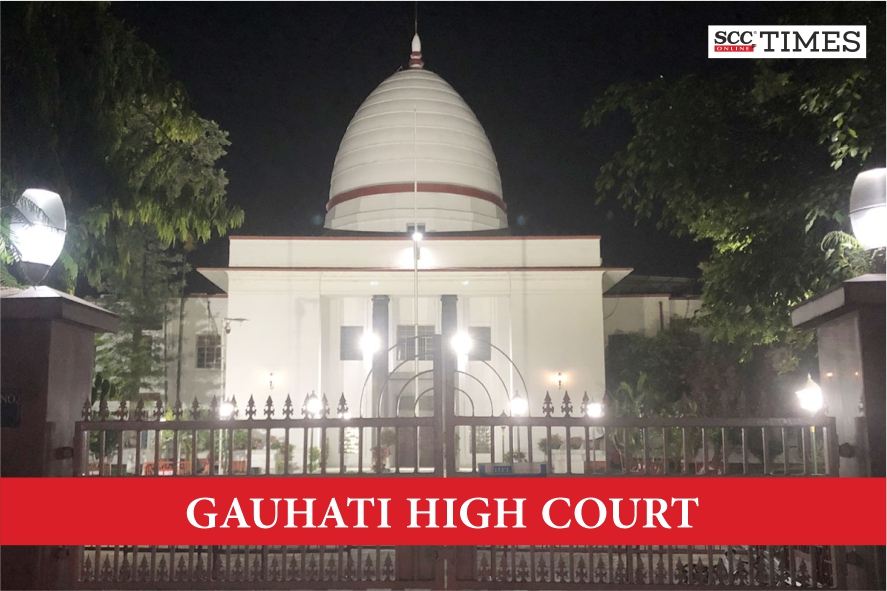Gauhati High Court: In a bail application filed by a hospitalised arrestee who was neither produced before a Magistrate nor remanded to custody, a Single Judge Bench of Mridul Kumar Kalita, J., allowed the application, holding that since the arrestee was neither granted bail nor remanded to judicial/police custody, his arrest stood vitiated after 24 hours. The Court further held that the non-production of the arrestee before the Magistrate amounted to a violation of his fundamental right to liberty guaranteed under Article 21 of the Constitution.
Background
The informant alleged that when he entered a State Bank of India ATM booth, he found two other persons inside. These persons saw the informant’s PIN and changed his ATM card. Thereafter, it was found that Rs. 40,000 was withdrawn from the informant’s account.
Accordingly, the informant lodged the FIR. The arrestee was taken into custody in connection with this case.
It was contended that the arrestee was tortured by the police and admitted to Gauhati Medical College and Hospital (‘GMCH’) soon after his arrest. The forwarding report submitted by the Investigating Officer(‘IO’) stated that the arrestee sustained injuries because he fell from the hillside while attempting to flee and had to be taken to the hospital. Further, in the forwarding report, the IO stated that the arrestee may be produced before the Magistrate through video conferencing, however, the Magistrate neither allowed the petitioner to be produced through video conferencing nor did he visit the hospital to ascertain the arrestee’s condition.
The Magistrate allowed the IO to produce the arrestee as soon as he was released from the hospital, however, no order was passed as to whether the arrestee was remanded to judicial or police custody. Thus, the arrestee had been under arrest since 15-04-2025 without there being any order for his remand, either judicial or police.
Analysis
The Court noted that it appeared that the investigation had progressed fairly. The arrestee, after his arrest, had sustained serious injuries on his leg and had been admitted to the GMCH for the last 45 days. Furthermore, there was no remand order in connection with the criminal case.
The Court reiterated that Article 22 of the Constitution mandated that every person who is arrested and detained in custody shall be produced before the nearest Magistrate within 24 hours of his arrest, excluding the time taken for the journey from the place of arrest to the Court or the Magistrate and no such person shall be detained in custody beyond the said period without the authority of a Magistrate. The Court noted that in the instant case, though the arrestee was arrested on 14-04-2025, there was neither an order of police/judicial remand nor was he released on bail.
The Court stated that it appeared that the Magistrate erred in not passing any order regarding the production of the hospitalised arrestee through video conferencing mode when such a prayer was made by the IO and by simply allowing the IO to produce the arrestee before him as and when the arrestee was released from the hospital. The Court held that such an order that did not clarify the status of the arrestee, as to whether he was in custody or a free person when the arrest was reported, violated Section 57 of the Bharatiya Nagarik Suraksha Sanhita, 2023 (‘BNSS’) and Article 22(2) of the Constitution.
The Court stated that there may be exceptions to the requirement of producing the arrestee within 24 hours, such as in the instant case where the arrestee was injured and required urgent medical care. In such cases, the Magistrate may ascertain the condition of the arrestee through video conferencing or by personally visiting them. If a person is not released on bail after arrest, an order for remand to judicial custody has to be made, though it can be qualified by clarifying that the arrestee may continue to stay in the hospital if needed. For the said purpose, the Magistrate may also call for a report from the hospital where the arrestee has been admitted.
The Court further noted that Section 187 of the BNSS categorically states that subject to the condition of bail, the Magistrate may authorise his detention either in judicial or in police custody. Unless such an order is passed, the initial arrest of the petitioner beyond the period of 24 hours from the time of his arrest will become illegal. Noting this, the Court stated that as the arrestee was admitted to the GMCH since his arrest, it appeared that his status was not of a free person but of an arrestee. He had neither been granted bail nor was an order passed under Section 187 of the BNSS.
Thus, the Court held that in the absence of any order of remand beyond 24 hours from the time of his arrest, his arrest stood vitiated on completion of 24 hours in custody. Furthermore, his non-production amounted to a violation of his fundamental right to liberty guaranteed under Article 21 of the Constitution.
Consequently, the Court granted bail to the arrestee upon furnishing a bail bond of Rs 30,000 with two sureties of the like amount subject to the satisfaction of the Chief Judicial Magistrate concerned.
[Bittu Kumar v. State of Assam, 2025 SCC OnLine Gau 2842, decided on 02-06-2025]
Advocates who appeared in this case :
For the petitioner: S Mitra, R. Rameez, And A K Boro
For the respondent: Public Prosecutor for Assam



